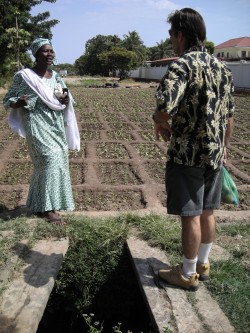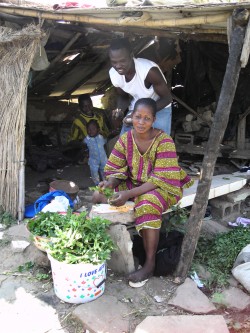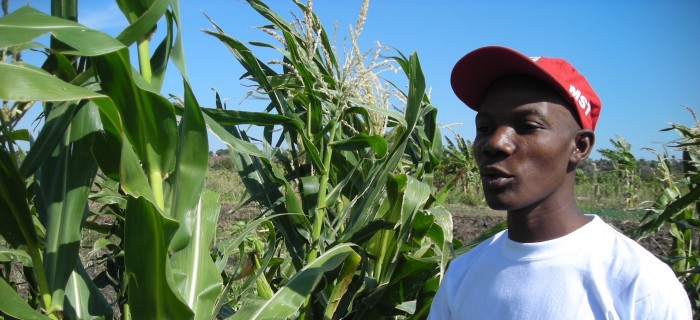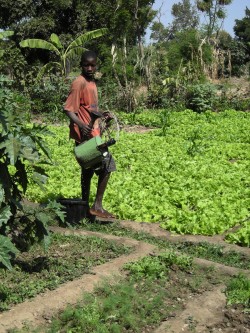Agroecology: the bold future for Africa
On Oct 4, 2013 leaders of the Food and Agriculture Organization of the United Nations (FAO), and La Via Campesina, the world’s largest international peasants movement, signed an agreement for collaboration. One result of this agreement was The International Symposium on Agroecology for Food and Nutritional Security, held at the headquarters FAO in Rome in September 2014. For the first time the FAO officially and directly addressed the topic of agroecology. As a follow up to this symposium, for 2015 the FAO organized three regional meetings to “facilitate a dialogue about agroecology, its benefits, challenges and opportunities focusing at regional and national levels.” The topic of public policy to favor agroecology figures prominently in all three regional agendas.
The regional meeting for Latin America and the Caribbean was held in Brasilia, Brazil in June. The Africa meeting will be held in Dakar, Senegal in November, and the Asia and Pacific regional meeting will happen in Bangkok, Thailand in late November.
The FAO recognizes that “Agroecology . . . is an approach that will help to address the challenge of ending hunger and malnutrition in all its forms, in the context of the climate change adaptation needed.” However, this position is not shared evenly within the FAO. Further, unlike La Vía Campesina and many agroecological scientists, the FAO does not recognize agroecology as a social movement or as part of the movement for food sovereignty but as ‘another technical approach.’
These conceptual and political divergences open many questions for scientists and social movements who have been advancing agroecology for decades:
- What synergies can exist between the FAO, agroecology scientists and farmers movements without losing ground (i.e. becoming co-opted) by the dominant agro-industrial paradigm that dominates the FAO?
- Is agroecology really important and feasible in the FAO agenda or is it only another tool as GMOs, climate smart agriculture, and “sustainable” intensification—all of which are anathema to agroecology and peasant farmers?
- And finally, does this alliance with FAO have any potential to help to scale-up the social aims of agroecology and food sovereignty such as redistribution of the wealth and land reform?
These questions and many more will be discussed during the regional meetings.
In anticipation of the regional meeting in Africa, the Alliance for Food Sovereignty in Africa prepared a statement entitled “Agroecology—the bold future for Africa.’ The document challenge3s African governments to support truly sustainable and equitable solutions for agriculture.
Stay in the loop with Food First!
Get our independent analysis, research, and other publications you care about to your inbox for free!
Sign up today!Agroecology the bold future for Africa
By Alliance for Food Sovereignty in Africa
It’s time for us to recognize that agroecology is the future of farming in Africa!
Industrial agriculture is a dead end. It claims to have raised yields in places but it has done so at great cost, with extensive soil damage, huge biodiversity loss and negative impacts on nutrition, food sovereignty and natural resources.
In many ways, agroecology is the antithesis of current conventional, corporate-driven, monoculture-based agricultural systems. Where conventional agriculture seeks to simplify, agroecology embraces complexity. Where conventional agriculture aims to eliminate biodiversity, agroecology depends on diversity, and builds upon it. Where conventional agriculture turns farmers into unskilled labourers, agroecology is knowledge intensive, building on traditional agricultural practices with modern research and technology, strengthening the sovereignty of small-scale family farmers. Where conventional agriculture is based on one-size-fits-all fixes like GMOs, chemical fertilisers and pesticides, agroecology provides local solutions to local problems. Where conventional agriculture pollutes and degrades, agroecology regenerates and restores, working with nature – not against nature.
Industrial agriculture has made farmers dependent on external inputs and undermined their resilience, particularly to climate change. New technologies emerge but these mostly address the problems created by industrial agriculture itself. Genetic engineering is a prime example.
Industrial agriculture has made farmers dependent on external inputs and undermined their resilience, particularly to climate change.
Agroecology is the journey that African farming should be making. It’s a journey towards thriving living soil, towards increasing biodiversity, towards strengthening farmer innovation, knowledge development and sharing, and towards far higher levels of nutrition security. We are not saying that this vision can be reached overnight. Far from it! It is a journey, a transition. Farmers currently using green revolution practices and addicted to external inputs cannot stop using them immediately; it will have to be gradual.
Agroecology is the journey that African farming should be making.
Agroecology is about starting with what’s there now; it’s about building the soil as a living organism and taking advantage of the incredible work of trillions of microorganisms; it’s about managing pests through natural practices starting with increased biodiversity; and it’s about focusing knowledge development at the local level.
The strongest resistance to agroecology comes from the vested interests of agribusiness, fertilizer, agrochemical and biotech companies that use “feeding the world” as a narrative to increase their profits from input sales. For almost a century, mainstream efforts have been focused on developing industrial agricultural practices. Billions of dollars have gone into this, much of it financed by corporations whose research has been paid back many times through the sale of agricultural inputs. Agroecology’s dilemma is that it doesn’t offer such returns-on-research and so the corporate world is not interested.
Does Africa want to take its farmers down the industrial agriculture route just because there is money on the table? This is the crucial question for policy makers across the continent. It’s time for Africa to find long-term solutions rather than just going for symptom-treating, short-term fixes.
Can African policy makers be bold enough to embrace the sustainable solution? Or are they going to wait until it’s too late, until the soils are exhausted, biodiversity devastated, nutritional problems mounting, and farmers dependent on outside inputs and knowledge?
For many years agroecology was considered on the fringe and idealistic. Steadily and surely, agroecology has gained recognition as people have come to recognize that it is the sustainable route to take. The report of the FAO 2014 International Symposium noted that to fully adopt agroecology we must now take the difficult step of re?designing our policies and programmes.
To make this bold transition the following actions are needed:
- Mainstream agroecology in regional and national agriculture policies, plans and programmes;
- Bring more researchers on board to support a variety of research, collaborating with farmers to understand the potential of agroecology, its challenges and opportunities;
- Stop subsidizing industrial agriculture; focus more resources on agroecology;
- Support community?based seed systems, where food and nutrition security begins;
- Give much greater recognition to indigenous knowledge and innovation through its inclusion in agriculture initiatives;
- Incorporate agroecology in extension service provision, and strengthen the practice of farmer-to-farmer learning, up-scaling the range of innovative practices already being used;
- Raise awareness among consumers of the nutritional benefits of agroecology;
- Bring agroecology into all levels of education, especially tertiary in collaboration with ?universities and colleges;
- Support the on-going development of labour-saving technologies;
- Focus on the localized development of sustainable food systems and not ‘value chains’, which capture and hold hostage many actors as only a chain can do;
- Stimulate and support small businesses throughout the food system to be part of the transition towards agroecology.
We call upon governments and policy-makers to recognize and value the huge potential of agroecology to sustainably increase food security and food sovereignty, reducing poverty and hunger while conserving biodiversity and respecting indigenous knowledge and innovation. We call upon development partners to refocus their resources towards agroecology. We call upon researchers to refocus their studies towards agroecology.
In a world threatened by man-made climate change, by environmental degradation, by hunger and poverty; in a world committed to ambitious sustainable development goals, and phasing out fossil fuels; now is the time to call a halt to business-as-usual food systems, and boldly begin the journey towards agroecology – the future of farming in Africa.



 Help Food First to continue growing an informed, transformative, and flourishing food movement.
Help Food First to continue growing an informed, transformative, and flourishing food movement.




